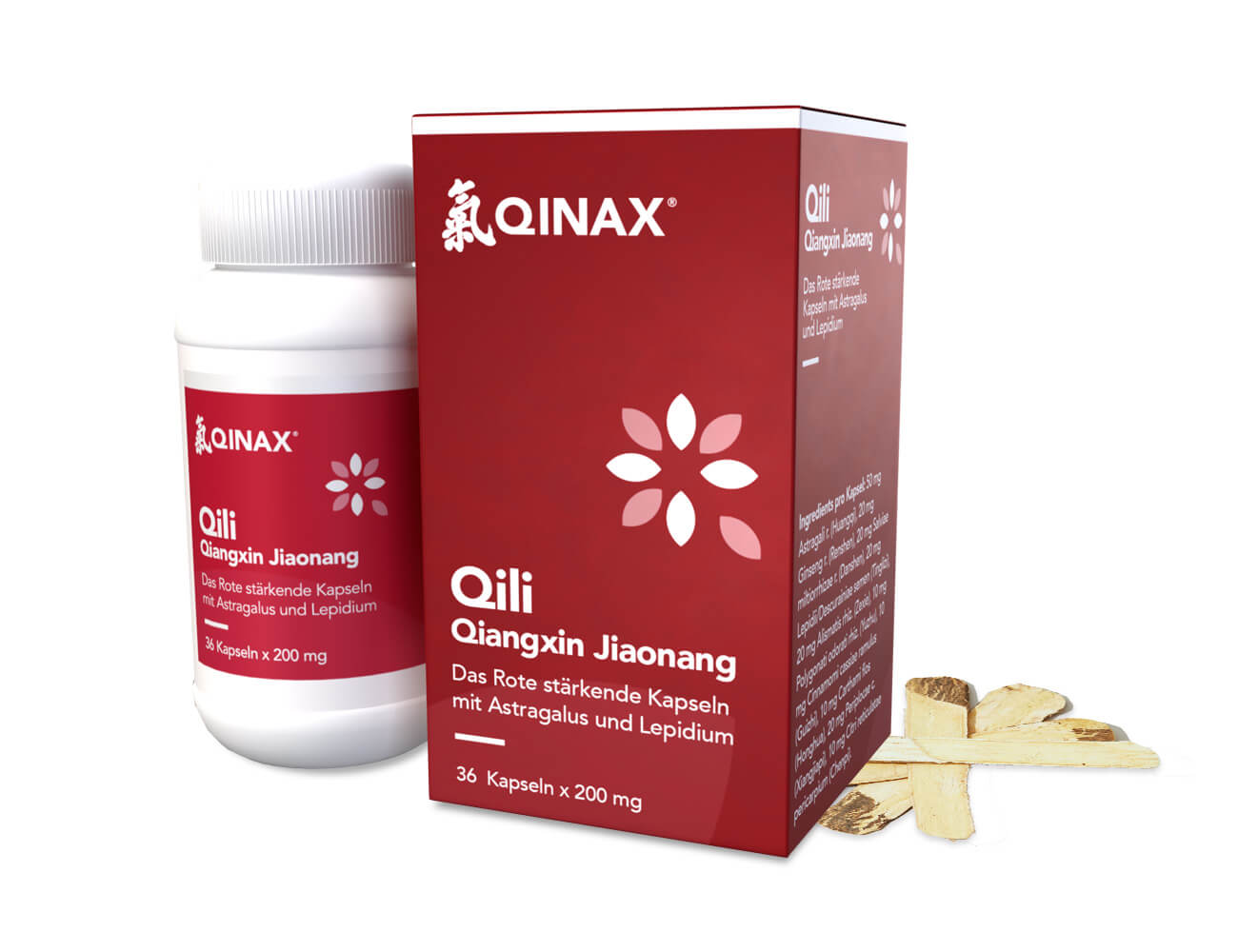
Qinax qili qiangxin jiaonang capsules
" Qili qiangzin jiaonang - Heart strengthening capsule with astragalus and lepidium
-
Qili Qiangxin Jiaonang(芪苈强心胶囊) is a patented herbal formula in Traditional Chinese Medicine (TCM) that is mainly used to treat cardiovascular diseases, especially heart failure. The formula was developed to strengthen the heart, improve blood circulation and relieve symptoms such as shortness of breath and edema.
Qili Qiangxin Jiaonang contains a combination of several important herbs that work synergistically to strengthen the heart and support the body.
Possible indications in TCM:
-
Relief of edema:
- Possible promotion of diuresis: Some of the herbs contained in the formula can have a diuretic effect and, according to the teachings of TDM, can help to remove excess fluid from the body, which could reduce edema (swelling).
- Possible support for kidney function: By potentially promoting kidney function, the formula can help reduce water retention in the body, which is common in heart failure.
-
Treatment of heart failure:
- Strengthen Qi and Yang: The formula aims to be able to strengthen the heart qi and yang, which is considered to be the root cause of heart failure in TCM. It can support heart function and can improve the heart's ability to pump blood.
- Possible removal of blood stasis: Qili Qiangxin Jiaonang can improve blood circulation, remove blood stasis and promote oxygen supply to the heart. This can help relieve symptoms such as chest pain and shortness of breath.
-
Improvement in cardiac performance and quality of life:
- Possible increase in resilience: According to TCM teachings, patients who suffer from reduced physical performance due to heart failure could experience an improvement in their resilience and quality of life by taking Qili Qiangxin Jiaonang.
- Possible relief of fatigue and shortness of breath: The formula may help to alleviate the symptoms of chronic fatigue and shortness of breath that often occur with heart failure.
A study from China published in August 2024, which you can find under Studies / References, indicates that Qili Qiangxin Jiaonang may not only reduce the likelihood of readmission to hospital, but may also reduce mortality. The study was conducted as a randomized, double-blind, placebo-controlled trial.
Dosage
Take orally, 2 -4 capsules 3 times a dayPossible side effects
None yet known.Contraindications
None yet known.Information for consumers
Food supplements are not a substitute for a varied diet. The recommended daily intake of Qili Qiangxin Jiaonang stated in this product information should not normally be exceeded.The effects and areas of application described are based on traditional applications and findings of Traditional Chinese Medicine (TCM). A scientifically substantiated effectiveness in the sense of Western medicine has not yet been conclusively proven. A doctor or therapist should always be consulted in the event of existing health problems.
-
Relief of edema:
-
Content
50 mg Astragali radix(Huangqi), 20 mg Ginseng radix(Renshen), 10 mg Aconiti radix lateralis praeparata(Fuzi), 20 mg Salviae miltiorrhizae radix(Danshen), 20 mg Lepidii/Descurainiae semen(Tinglizi), 20 mg Alismatis rhizoma(Zexie), 10 mg Polygonati odorati rhizoma(Yuzhu), 10 mg Cinnamomi cassiae ramulus(Guizhi), 10 mg Carthami flos(Honghua), 20 mg Periplocae cortex(Xiangjiapi), 10 mg Citri reticulatae pericarpium(Chenpi)
-
Quality assurance has the highest priority for us
Protection against heavy metals
Our products are tested for heavy metal contamination for safety reasons. Every product is tested for arsenic, cadmium, lead, mercury and other heavy metals. These tests are carried out by the largest specialized laboratory in the Netherlands NutriControl BV. ( www.nutricontrol.nl )Testing for microbial contamination
All products are free from contamination, insecticides, fungicides, herbicides and pesticides. This is also tested by the above-mentioned scientific laboratory for all products. A further microbiological test is carried out for E. coli, Staphylococcus aureus, salmonella, entrobacteria and other gram-negative bacteria. -
Studies - References



